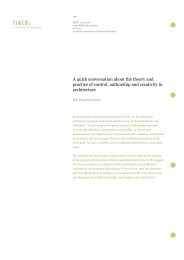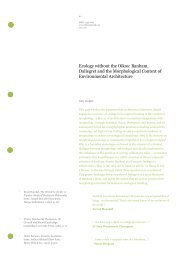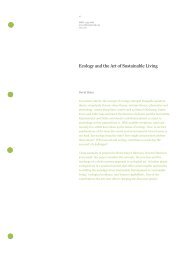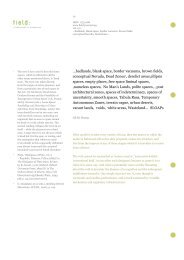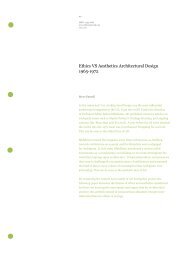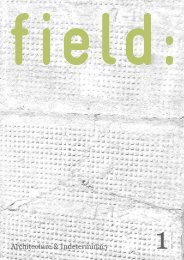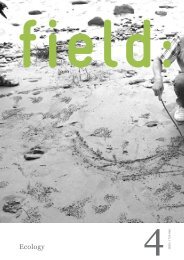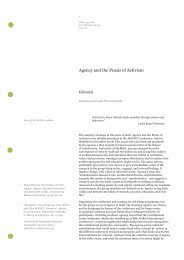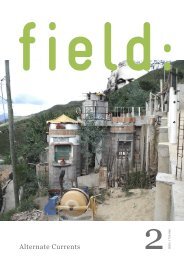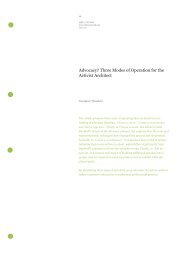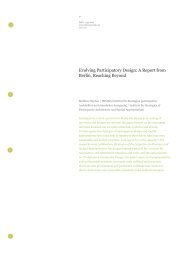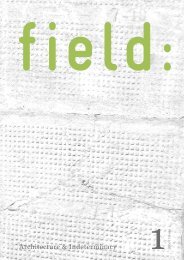Gregory Bateson's Ecological Aesthetics - an ... - field journal
Gregory Bateson's Ecological Aesthetics - an ... - field journal
Gregory Bateson's Ecological Aesthetics - an ... - field journal
Create successful ePaper yourself
Turn your PDF publications into a flip-book with our unique Google optimized e-Paper software.
35<br />
ISSN: 1755-068<br />
www.<strong>field</strong>-<strong>journal</strong>.org<br />
vol.4 (1)<br />
<strong>Gregory</strong> Bateson’s <strong>Ecological</strong> <strong>Aesthetics</strong> - <strong>an</strong><br />
addendum to Urb<strong>an</strong> Political Ecology<br />
Jon Goodbun<br />
In the last decade there has been a shift in our underst<strong>an</strong>ding <strong>an</strong>d<br />
awareness of the scale <strong>an</strong>d profundity of the global environmental crisis<br />
that industrial capitalism, combined with a certain cultural hubris<br />
regarding our ‘relation to nature’ (see below), has inst<strong>an</strong>tiated. Ecology, a<br />
term that emerged into popular consciousness in the 60’s as a byword for<br />
radical ‘holistic’ <strong>an</strong>d ‘systemic’ thinking, has returned to prominence in<br />
recent years across all kinds of <strong>field</strong>s - once again as a way of signalling <strong>an</strong><br />
attempt to engage with broader environmental questions.<br />
Within the natural sciences, ecology is above all characterised by a<br />
non-reductive holistic approach that focuses on the org<strong>an</strong>isation <strong>an</strong>d<br />
internal/external relational dynamics of ‘wholes’ or ‘assemblages’ (such<br />
as ecosystems). This is in contradistinction to the orthodox ideology of<br />
modern scientific practice, which is based upon a reductivist <strong>an</strong>alysis<br />
of phenomenal wholes into ‘fundamental’ parts. Through the twentieth<br />
century ecology co-evolved with associated disciplines such as cybernetics<br />
<strong>an</strong>d systems theory, <strong>an</strong>d m<strong>an</strong>y import<strong>an</strong>t theorists - including for example<br />
Ludwig von Bertall<strong>an</strong>fy, <strong>Gregory</strong> Bateson <strong>an</strong>d James Lovelock - migrated<br />
between these different areas, making contributions to all. Outside of<br />
the biological sciences, ecology has come to signify something closer to a<br />
paradigm rather th<strong>an</strong> a specific discipline, as a culture <strong>an</strong>d holistic science<br />
of systemic interconnection in general.
1 Ernst Haeckle, cited in Reiner<br />
Grundm<strong>an</strong>n, Marxism <strong>an</strong>d Ecology,<br />
(Oxford: Clarendon, 1991), p.1. In fact, the<br />
complexity of <strong>an</strong>y critical <strong>an</strong>d ideological<br />
underst<strong>an</strong>ding of ecological thought is<br />
soon revealed through a consideration of<br />
the work of its nominal ‘founder,’ Ernst<br />
Haeckel. One of the most import<strong>an</strong>t<br />
scientists of the late nineteenth/early<br />
twentieth century period, he is still<br />
well known still today on account of his<br />
extraordinary drawings of pl<strong>an</strong>ts <strong>an</strong>d<br />
org<strong>an</strong>isms. He was <strong>an</strong> early (holisticorg<strong>an</strong>ic)<br />
systems thinker in biology,<br />
<strong>an</strong>d helped to develop the concept of <strong>an</strong><br />
environment. Marx <strong>an</strong>d Engels considered<br />
his early scientific work favourably.<br />
Later in his career, Hackael, like some in<br />
Engl<strong>an</strong>d, beg<strong>an</strong> to adopt social Darwini<strong>an</strong><br />
positions. However, whereas social<br />
Darwinism expressed <strong>an</strong> individualist<br />
libertari<strong>an</strong>ism (Spencer’s ‘survival of<br />
the fittest’) in Engl<strong>an</strong>d, Haeckel’s took<br />
a decidedly nationalist-collectivist turn.<br />
Hackael actually denied the validity of<br />
the concept of hum<strong>an</strong>ity altogether,<br />
claiming that it was a internationalising<br />
socialist fiction <strong>an</strong>d that actually so-called<br />
hum<strong>an</strong>ity was a mix of distinct species<br />
(some closer to the <strong>an</strong>imal world th<strong>an</strong><br />
others), <strong>an</strong>d that these were further<br />
determined by their environmental<br />
regions into national races. It was the<br />
combination of race plus region that<br />
defined the nation as <strong>an</strong> org<strong>an</strong>ism,<br />
competing for Lebensraum. Needless<br />
to say, Haeckel’s version of org<strong>an</strong>icism<br />
proved all too useful to fascist ideologues.<br />
2 Al<strong>an</strong> Watts, cited in Douglas G Flemons,<br />
Completing Distinctions - Interweaving<br />
the Ideas of <strong>Gregory</strong> Bateson <strong>an</strong>d<br />
Taoism into a unique approach to<br />
Therapy (Boston: Shambala, 1991) p.31<br />
36<br />
www.<strong>field</strong>-<strong>journal</strong>.org<br />
vol.4 (1)<br />
As a discourse, ecology brings together m<strong>an</strong>y contradictory roots. It<br />
exists as a hard scientific discipline, yet it also has allegi<strong>an</strong>ces with the<br />
environmental movement <strong>an</strong>d ecocentric theory in a wider sense that gives<br />
it <strong>an</strong> irreducible complexity; combining m<strong>an</strong>y of the insights of modern<br />
science but mixed together with intellectual, religious <strong>an</strong>d rom<strong>an</strong>tic<br />
legacies, ideas <strong>an</strong>d practices that are from beyond the enlightenment<br />
(either predating it, <strong>an</strong>d/or from remote cultures). For example, ecocentric<br />
thinkers might typically assert that the western scientific method <strong>an</strong>d<br />
ideology promotes views of the natural world as something to be exploited<br />
<strong>an</strong>d experimented upon. They then go on to cite scientific evidence<br />
collected as proof of this damage!<br />
Today, ecology as a suffix is frequently used to signify a general systems<br />
theory (often combined with environmental awareness) based approach to<br />
<strong>an</strong>y complex area. Think for example of the growing plethora of disciplines<br />
such as hum<strong>an</strong> ecology, social ecology, deep ecology, industrial ecology<br />
<strong>an</strong>d political ecology, to name but a few. In architectural theory <strong>an</strong>d in<br />
design teaching especially, there have been proposed <strong>an</strong> ever-exp<strong>an</strong>ding<br />
series of ecology-based concepts: cybernetic ecologies; machine ecologies;<br />
stealth ecologies; perform<strong>an</strong>ce ecologies <strong>an</strong>d so on. Clearly, the role of<br />
ecological <strong>an</strong>alysis in articulating the stresses that contemporary industrial<br />
systems are placing upon the biosphere has been a particularly import<strong>an</strong>t<br />
area of development. Below I focus on two such str<strong>an</strong>ds within ecological<br />
theory.<br />
Underst<strong>an</strong>ding socio-economic-ecological systems in relation to social<br />
justice has become a key task of urb<strong>an</strong> political ecology - perhaps the most<br />
import<strong>an</strong>t extension to ecological theory to emerge in recent years. In this<br />
paper I will explore some of the precursors of contemporary urb<strong>an</strong> political<br />
ecology (UPE) in the basic relations between ecology, economics <strong>an</strong>d the<br />
architectural-urb<strong>an</strong>. In particular, I will turn to consider the thinking of<br />
the British post-war <strong>an</strong>thropologist, cybernetici<strong>an</strong> <strong>an</strong>d ecologist <strong>Gregory</strong><br />
Bateson. In Bateson’s work we c<strong>an</strong> find one the most innovative <strong>an</strong>d<br />
import<strong>an</strong>t re-conceptions of the overall project of ecology - <strong>an</strong>d I suggest<br />
that the work of this maverick thinker might have some import<strong>an</strong>t<br />
contributions to make to the development of urb<strong>an</strong> political ecology today.<br />
Ecology <strong>an</strong>d Economy<br />
First coined in print by Ernst Haeckel, who defined it as “the relations of<br />
living org<strong>an</strong>isms to their surroundings,” 1 ecology questions our definitions<br />
of what is <strong>an</strong> org<strong>an</strong>ism, <strong>an</strong>d what is <strong>an</strong> environment, questions that are<br />
not as straight forward as common sense definitions might suggest. Al<strong>an</strong><br />
Watts noted that “the boundary of the org<strong>an</strong>ism is also the boundary of its<br />
environment,” 2 <strong>an</strong>d James J. Gibson similarly observed that “it is often<br />
neglected that the words <strong>an</strong>imal <strong>an</strong>d environment make <strong>an</strong> inseparable<br />
<strong>Gregory</strong> Bateson’s <strong>Ecological</strong> <strong>Aesthetics</strong> Jon Goodbun
3 James J. Gibson, The <strong>Ecological</strong><br />
Approach to Visual Perception (Boston:<br />
Houghton Mifflin, 1979) p.8.<br />
4 Adri<strong>an</strong> Forty, Words <strong>an</strong>d Buildings: A<br />
Vocabulary of Modern Architecture<br />
(London: Thames <strong>an</strong>d Hudson,<br />
2000) p.220. Forty does in fact<br />
refer to both Smith <strong>an</strong>d Harvey<br />
in this chapter (‘Nature’).<br />
5 See Timothy Morton, The <strong>Ecological</strong><br />
Thought (Cambridge, MA <strong>an</strong>d London:<br />
Harvard University Press, 2010), <strong>an</strong>d<br />
Timothy Morton, Ecology without<br />
Nature: Rethinking Environmental<br />
<strong>Aesthetics</strong> (Cambridge, MA.:<br />
Harvard University Press, 2007).<br />
37<br />
www.<strong>field</strong>-<strong>journal</strong>.org<br />
vol.4 (1)<br />
pair. Each term implies the other.” 3 <strong>Gregory</strong> Bateson, drawing upon Alfred<br />
North Whitehead, noted that the fundamental unit of evolution was not<br />
the org<strong>an</strong>ism, but rather the org<strong>an</strong>ism plus environment, whilst fellow<br />
cybernetic biologists Humberto Matur<strong>an</strong>a <strong>an</strong>d Fr<strong>an</strong>sisco Varela similarly<br />
noted that org<strong>an</strong>isms are ‘structurally coupled’ to <strong>an</strong>d ‘co-evolving’ with<br />
their environments. The ‘relations’ that Haeckel refers to then are in<br />
complex ways, networks of internal <strong>an</strong>d external flows that operate at<br />
multiple org<strong>an</strong>isational scales or orders. In the case of the hum<strong>an</strong>, they<br />
describe a set of org<strong>an</strong>ism-environment relations that must include social,<br />
cultural <strong>an</strong>d economic agents. Nonetheless, the basic definition of ecology<br />
as the study of org<strong>an</strong>ism-environment relations, clearly gives it some<br />
shared concerns with architecture <strong>an</strong>d urb<strong>an</strong>ism, which might themselves<br />
be broadly defined as the production of the environment of the hum<strong>an</strong><br />
org<strong>an</strong>ism, <strong>an</strong>d the study of the relations between individual <strong>an</strong>d collective<br />
hum<strong>an</strong> entities <strong>an</strong>d their environments.<br />
Different forms of ecological theory typically work through <strong>an</strong>d define<br />
different conceptions of nature. In, for example, the various forms of deep<br />
ecology, there is paradoxically a very distinct <strong>an</strong>d thoroughly cultural<br />
conception of nature as that which entirely other to <strong>an</strong>d opposed to hum<strong>an</strong><br />
culture, a nature that always “knows best.” Adri<strong>an</strong> Forty has noted that<br />
“the distinction between the world created by m<strong>an</strong> – ‘culture’ - <strong>an</strong>d the<br />
world in which m<strong>an</strong> exists – ‘nature’ - has been perhaps the single most<br />
import<strong>an</strong>t mental category ever conceived.” 4 Certainly in ecological<br />
discourse, the tension between a conception of nature in opposition to<br />
culture (like deep ecology), <strong>an</strong>d a conception of culture as a part of nature<br />
(like urb<strong>an</strong> political ecology), defines some of the clearest distinctions<br />
between different ecological traditions. Increasingly, some theorists<br />
suggest that ecological thought needs to move beyond the concept of<br />
nature entirely. 5<br />
Nonetheless, both of the str<strong>an</strong>ds that I am considering here (UPE <strong>an</strong>d<br />
Bateson) do continue to use the term nature, but in both cases see hum<strong>an</strong><br />
culture (or second nature) dialectically, as a part of nature. David Harvey<br />
has developed Marx’s conception of a hum<strong>an</strong> ‘relation to nature’ in his<br />
<strong>an</strong>alysis of Capital, to describe the sum of both our metabolic interaction<br />
with the wider non-hum<strong>an</strong> world that we find ourselves in, <strong>an</strong>d our mental<br />
conceptions of this relation. Harvey states that<br />
<strong>Gregory</strong> Bateson’s <strong>Ecological</strong> <strong>Aesthetics</strong> Jon Goodbun
6 David Harvey, The Enigma of<br />
Capital - <strong>an</strong>d the Crises of Capital<br />
(London: Profile Books, 2010) p.74.<br />
7 John Bellamy Foster, Marx’s<br />
Ecology (New York: Monthly<br />
Review Press, 2000) pp.15-16.<br />
8 Erik Swyngedouw ‘Metabolic<br />
Urb<strong>an</strong>isation - The making of cyborg<br />
cities’ in Nik Heynen, Maria Kaika <strong>an</strong>d<br />
Erik Swyngedouw (eds.), In the Nature<br />
of Cities - Urb<strong>an</strong> Political Ecology<br />
<strong>an</strong>d the politics of Urb<strong>an</strong> Metabolism<br />
(London: Routledge, 2006) p.26.<br />
9 ibid., p.22.<br />
38<br />
www.<strong>field</strong>-<strong>journal</strong>.org<br />
vol.4 (1)<br />
'Construing the relation to nature as inherently dialectical indicates<br />
a r<strong>an</strong>ge of possible tr<strong>an</strong>sformations in hum<strong>an</strong> relations as well<br />
as a possible process of natural evolution, including the hum<strong>an</strong><br />
production of nature itself, that renders this relation dynamic <strong>an</strong>d<br />
perpetually open. While on the one h<strong>an</strong>d such a formulation would<br />
appear to deny the possibility of <strong>an</strong>y out-<strong>an</strong>d-out or prolonged,<br />
let alone ‘final’, environmental crisis, it also carries within it the<br />
prospect for cascading unintended consequences <strong>an</strong>d widespread<br />
disruptive effects for the continuity of daily life as we know it.'6 Harvey’s conception of our relation to nature must be understood within<br />
the context of <strong>an</strong> associated group of neo-Marxist theorists (others would<br />
include Neil Smith, John Bellamy Foster <strong>an</strong>d Ted Benton), all of whom<br />
have consistently argued that there c<strong>an</strong> be found in Marx the conceptual<br />
framework of a modern ecological theory, <strong>an</strong>d that we need to underst<strong>an</strong>d<br />
Marx as a fundamentally ecological thinker. Foster in particular has<br />
attempted to reveal Marx’s ecology, noting that<br />
'A thoroughgoing ecological <strong>an</strong>alysis requires a st<strong>an</strong>dpoint that is<br />
both materialist <strong>an</strong>d dialectical … [A] materialist sees evolution as<br />
<strong>an</strong> open-ended process of natural history, governed by contingency,<br />
but open to rational expl<strong>an</strong>ation. A materialist viewpoint that is<br />
also dialectical in nature (that is, a non mech<strong>an</strong>istic materialism)<br />
sees this as a process of tr<strong>an</strong>smutation of forms in a context<br />
of interrelatedness that excludes all absolute distinctions …. A<br />
dialectical approach forces us to recognise that org<strong>an</strong>isms in<br />
general do not simply adapt to their environment; they also affect<br />
that environment in various ways by affecting ch<strong>an</strong>ge in it.'7 These texts have provided <strong>an</strong> import<strong>an</strong>t part of the critical c<strong>an</strong>on of the<br />
discourse of urb<strong>an</strong> political ecology. In a key paper, in which he draws<br />
heavily upon Foster, Erik Swyngedouw has argued that “‘metabolism’ is<br />
the central metaphor for Marx’s definition of labour <strong>an</strong>d for <strong>an</strong>alysing the<br />
relationship between hum<strong>an</strong> <strong>an</strong>d nature,” 8 <strong>an</strong>d proposes that “historical<br />
materialism has been among the first social theories to embrace <strong>an</strong>d<br />
mobilise ‘metabolism’ <strong>an</strong>d ‘circulation’ as entry-points in undertaking<br />
[Jameson’s] ‘ontologies of the present that dem<strong>an</strong>d archaeologies of the<br />
future’.” 9<br />
Although UPE represents a distinct, contemporary attempt to think<br />
ecology as <strong>an</strong> urb<strong>an</strong> <strong>an</strong>d economic concept, this is by no me<strong>an</strong>s <strong>an</strong><br />
entirely novel move. The word ecology is derived from Greek oikos<br />
me<strong>an</strong>ing household, <strong>an</strong>d it might be tr<strong>an</strong>slated as both the science of<br />
running a home <strong>an</strong>d the science of running <strong>an</strong> economy. Ecology shares<br />
<strong>Gregory</strong> Bateson’s <strong>Ecological</strong> <strong>Aesthetics</strong> Jon Goodbun
10 Ernst Haeckel, General Morphology<br />
of Org<strong>an</strong>isms; General Outlines of the<br />
Science of Org<strong>an</strong>ic Forms based on<br />
Mech<strong>an</strong>ical Principles through the Theory<br />
of Descent as reformed by Charles Darwin<br />
(Berlin). Quoted in Fr<strong>an</strong>k Benjamin<br />
Golley, A History of the Ecosystem<br />
Concept in Ecology (New Haven, Conn.:<br />
Yale University Press, 1993) p.207.<br />
11 Circulation was coined as a concept by<br />
the physici<strong>an</strong> William Harvey, in his<br />
research on blood flow in the body, in<br />
the early seventeenth century. It was, as<br />
Adri<strong>an</strong> Forty has observed, soon adopted<br />
into architectural thinking (as circulation<br />
through buildings), <strong>an</strong>d later political<br />
economy, as the circulation of money <strong>an</strong>d<br />
goods. For a discussion of the conceptual<br />
history of circulation <strong>an</strong>d metabolism<br />
(<strong>an</strong>d in relation to Marxi<strong>an</strong> political<br />
ecology) see Eric Swyngedouw ‘Metabolic<br />
Urb<strong>an</strong>isation: The making of Cyborg<br />
Cities’ in Nik Heynen, Maria Kaika <strong>an</strong>d<br />
Eric Swyngedouw (eds.), In the Nature of<br />
Cities: Urb<strong>an</strong> Political Ecology <strong>an</strong>d the<br />
politics of Urb<strong>an</strong> Metabolism (London:<br />
Routledge, 2006), pp.25-33. Adam Smith<br />
of course saw the free market economy<br />
as akin to <strong>an</strong> org<strong>an</strong>ism - a spectral entity<br />
whose “invisible h<strong>an</strong>d’ would emerge as<br />
a higher level of rational org<strong>an</strong>isation.<br />
12 Karl Marx, Capital vol.1 (London:<br />
Penguin, 1990) p.133.<br />
39<br />
www.<strong>field</strong>-<strong>journal</strong>.org<br />
vol.4 (1)<br />
with architecture this relation of dwelling <strong>an</strong>d economics. In fact, it also<br />
internalises m<strong>an</strong>y of the same complex contradictions that characterise<br />
modern architectural knowledge <strong>an</strong>d practice. The seam that ecology<br />
shares with the economic is much more that a shared etymology. In<br />
import<strong>an</strong>t ways much ecological theory c<strong>an</strong> be thought of as quite simply<br />
as <strong>an</strong> economics of nature, as indeed is suggested in one of the early protoecological<br />
texts, Linnaeus’ 1749 Oeconomy of Nature, <strong>an</strong>d confirmed in<br />
Haeckel, who stated in his initial definition that “by ecology we me<strong>an</strong> the<br />
body of knowledge concerning the economy of nature.” 10<br />
Not surprisingly then, there are a series of key concepts common to both<br />
ecology <strong>an</strong>d economy, most notably growth, <strong>an</strong>d circulation. 11 And as we<br />
have seen, Marx introduced some more process-org<strong>an</strong>icist concepts into<br />
political economy. For Marx metabolism was <strong>an</strong> extraordinarily signific<strong>an</strong>t<br />
concept, in that it described the fundamental process that labour was<br />
involved in, the moment of interface between the hum<strong>an</strong> org<strong>an</strong>ism <strong>an</strong>d the<br />
broader web of life. He stated that<br />
'Labour, as the creator of use values, as useful labour, is a condition<br />
of hum<strong>an</strong> existence which is independent of all forms of society;<br />
it is <strong>an</strong> eternal natural necessity which mediates the metabolism<br />
between m<strong>an</strong> <strong>an</strong>d nature, <strong>an</strong>d therefore hum<strong>an</strong> life itself.'12 However, if a radical socio-political form of ecology was set out by Marx<br />
in the nineteenth century, <strong>an</strong>d has been developed further in recent years,<br />
the mainstream of ecological discourse has unsurprisingly been shaped<br />
more directly by the concerns of capital. Ecology did not only tr<strong>an</strong>smit<br />
metaphors back <strong>an</strong>d forth between the <strong>an</strong>alysis of economic networks,<br />
<strong>an</strong>d the <strong>an</strong>alysis of non-hum<strong>an</strong> living systems. It was in addition, <strong>an</strong>d<br />
right from the start, a body of knowledge that developed in <strong>an</strong> applied<br />
sense, as the me<strong>an</strong>s of m<strong>an</strong>aging the integration <strong>an</strong>d exp<strong>an</strong>sion of the<br />
hum<strong>an</strong> economy into non-hum<strong>an</strong> economies. Ecology as a profession was<br />
one of a series of disciplines that co-emerged at the metabolic interface<br />
of capitalist production <strong>an</strong>d the pl<strong>an</strong>et in the eighteenth <strong>an</strong>d nineteenth<br />
centuries. Donald Worster has suggested that ecology has both arcadi<strong>an</strong><br />
<strong>an</strong>d imperialist roots, a double lineage that characterises m<strong>an</strong>y individual<br />
thinkers (such as Charles Darwin) as well as ecological thought as a whole.<br />
For example, amongst the first scientists to be employed in <strong>an</strong> ecological<br />
capacity were those of the Dutch <strong>an</strong>d English East India comp<strong>an</strong>ies<br />
from the late eighteenth century. These comp<strong>an</strong>ies, which encompassed<br />
everything from colonial government, to m<strong>an</strong>aging both local l<strong>an</strong>dscapes<br />
<strong>an</strong>d global material flows, me<strong>an</strong>t that they consciously confronted a need<br />
for systems thinking at the leading edge of capitalist development at the<br />
time.<br />
Ecology continued to theorise <strong>an</strong> economics of nature based primarily in<br />
the study of how energy <strong>an</strong>d matter flow through org<strong>an</strong>isms <strong>an</strong>d networks<br />
<strong>Gregory</strong> Bateson’s <strong>Ecological</strong> <strong>Aesthetics</strong> Jon Goodbun
13 The term ‘Ecosystem’ was first coined<br />
by Roy Clapham in 1930, although<br />
its modern sense derives from Arthur<br />
T<strong>an</strong>sley (1935). T<strong>an</strong>sley replaced<br />
Americ<strong>an</strong> pl<strong>an</strong>t ecologist, Frederic<br />
Clements’ concept of ‘super-org<strong>an</strong>ism’<br />
with ‘ecosystem’, which he defined as<br />
“a community of org<strong>an</strong>isms <strong>an</strong>d their<br />
physical environment interacting as <strong>an</strong><br />
ecological unit.” The term biosphere was<br />
introduced by Austri<strong>an</strong> geologist Eduard<br />
Suess in 1875 to describe the layer of<br />
life surrounding the earth. The term<br />
‘biosphere’ was however popularised<br />
<strong>an</strong>d given its full current me<strong>an</strong>ing - the<br />
ecosystem of ecosystems - by Russi<strong>an</strong><br />
geochemist Vladimir Vernadsky. In<br />
1926 Vernadsky - synthesising Goethe,<br />
Humboldt, <strong>an</strong>d Suess, <strong>an</strong>d <strong>an</strong>ticipating<br />
Margulis <strong>an</strong>d Lovelock - described the<br />
biosphere, <strong>an</strong>d the life of which it was<br />
composed, as a ‘geological force.’ He was<br />
among the first to realise the full extent<br />
that life had shaped the pl<strong>an</strong>et geologically<br />
<strong>an</strong>d compositionally, <strong>an</strong>d <strong>an</strong>ticipated<br />
much that James Lovelock would later<br />
describe in Gaia theory. For Vernadsky,<br />
the biosphere was not only a description<br />
of the site of life on Earth, it also classified<br />
<strong>an</strong> historical epoch in the pl<strong>an</strong>et’s<br />
development. The biosphere was the<br />
second stage in the evolution of the pl<strong>an</strong>et.<br />
The first stage he called the geosphere,<br />
<strong>an</strong>d this described the pl<strong>an</strong>et before<br />
life (<strong>an</strong>d of which there are of course<br />
subst<strong>an</strong>tial remaining legacies in non<br />
org<strong>an</strong>ic rocks, m<strong>an</strong>tel, core etc.). The third<br />
stage, which he termed noosphere, was<br />
the stage of hum<strong>an</strong> mind. For Vernadsky,<br />
just as the biosphere tr<strong>an</strong>sformed the<br />
geosphere, the noosphere is tr<strong>an</strong>sforming<br />
the biosphere. Variations of Vernadsky’s<br />
concept of noosphere include the sense<br />
of <strong>an</strong> emergent collective consciousness<br />
by Pierre Teilhard de Chardin.<br />
14 David Pepper, The Roots of Modern<br />
Environmentalism (London:<br />
Croom Helm, 1984), p.103-4.<br />
15 See for example Howard T. Odum,<br />
‘Energy, Ecology <strong>an</strong>d Economics’, AMBIO<br />
A Journal of the Hum<strong>an</strong> Environment.<br />
The Royal Swedish Academy of<br />
Science 2 (6), (1973): 220-227.<br />
40<br />
www.<strong>field</strong>-<strong>journal</strong>.org<br />
vol.4 (1)<br />
of org<strong>an</strong>isms. In the post war period Eugene Odum adopted the term<br />
‘ecosystem’, 13 <strong>an</strong>d, in the 1953 Fundamentals of Ecology written with his<br />
brother Howard T. Odum, they started to describe <strong>an</strong>d <strong>an</strong>alyse flows of<br />
matter <strong>an</strong>d energy through ecosystems as simple flow diagrams. As Pepper<br />
notes<br />
Energy <strong>an</strong>d matter flow along pathways within a system before<br />
leaving it, <strong>an</strong>d for <strong>an</strong> open system there is much exch<strong>an</strong>ge of<br />
matter between it <strong>an</strong>d the environment, whereas a closed system<br />
is characterised by maximum recycling of material ... Mature<br />
ecosystems (e.g. Appalachi<strong>an</strong> forests) display high org<strong>an</strong>isation (i.e.<br />
minimal entropy) because they are more diverse th<strong>an</strong> immature<br />
ecosystems. They have more species <strong>an</strong>d more niches are filled,<br />
<strong>an</strong>d they are able to capture more matter <strong>an</strong>d slow down energy<br />
dissipation. 14<br />
H. T. Odum especially pioneered theories <strong>an</strong>d practices around systems<br />
ecology <strong>an</strong>d ecological energetics, which included studies of hum<strong>an</strong>natural<br />
systems economics. 15 This later developed into the concept of<br />
‘emergy’, which studies the role that embodied energy plays in systems.<br />
H.T. Odum himself noted that “the study of energy in nature does not<br />
necessarily imply <strong>an</strong> economic framework. But that is the way it is has<br />
been assimilated.” 16<br />
Odum’s post-war attempts to generate out of ecology a universal<br />
systems l<strong>an</strong>guage paralleled broader developments. Increasingly, similar<br />
methods of <strong>an</strong>alysis <strong>an</strong>d representation were developed to try to grasp<br />
hum<strong>an</strong> ecologies, <strong>an</strong>d statistical <strong>an</strong>d conceptual tools migrated between<br />
economics, ecology, cybernetics <strong>an</strong>d general systems theory. In several<br />
cases architectural thought played import<strong>an</strong>t roles in helping to conceive<br />
of <strong>an</strong>d represent global systems, with signific<strong>an</strong>t contributions from<br />
thinkers such as Buckminster Fuller, Doxiades, <strong>an</strong>d Charles <strong>an</strong>d Ray<br />
Eames, for example. 17 Increasingly through the post-war period, ecological<br />
systems <strong>an</strong>alysis fed into long term policy studies in multinational<br />
corporations as much as national governments. At the same research such<br />
as the influential 1972 Club of Rome “Limits to Growth” 18 report, modelled<br />
future scenarios for natural <strong>an</strong>d hum<strong>an</strong> ecosystems under continuing<br />
growth of the industrial economy, <strong>an</strong>d fed into the environmental justice<br />
movement. 19<br />
<strong>Gregory</strong> Bateson’s <strong>Ecological</strong> <strong>Aesthetics</strong> Jon Goodbun
16 Eugene Odum, cited in David<br />
Pepper, Modern Environmentalism<br />
- An Introduction (London:<br />
Routledge, 1996), p.283-4.<br />
17 For a discussion of these see for<br />
example Mark Wigley, ‘Network Fever,’<br />
Grey Room 4 (2001): 82-122.<br />
18 Donella Meadows, Dennis Meadows,<br />
Jørgen R<strong>an</strong>ders, <strong>an</strong>d William W.<br />
Behrens III The Limits To Growth:<br />
A Report For The Club of Rome On<br />
The Predicament of M<strong>an</strong>kind (New<br />
York: Universe Books, 1972)<br />
19 One of the most signific<strong>an</strong>t examples<br />
of <strong>an</strong> ecological systems <strong>an</strong>alysis<br />
of the interaction of hum<strong>an</strong> <strong>an</strong>d<br />
natural ecosystems was the seminal<br />
environmental 1972 Club of Rome<br />
‘Limits to Growth’ report, produced by<br />
Jay Forrester <strong>an</strong>d the Systems Dynamics<br />
group at MIT. Forrester <strong>an</strong>d his group<br />
were amongst the first to use computers<br />
to model systems dynamics, <strong>an</strong>d their<br />
focus was the <strong>an</strong>alysis of hum<strong>an</strong> ecologies,<br />
<strong>an</strong>d their interaction with natural<br />
ecosystems. The Systems Dynamics group<br />
produced three global socio-economic<br />
resource flow models (WORLD1, 2 <strong>an</strong>d 3).<br />
Famously <strong>an</strong>d somewhat unexpectedly,<br />
all models predicted resource depletion/<br />
pollution based socio-economic<br />
collapse early in the 21st century.<br />
41<br />
www.<strong>field</strong>-<strong>journal</strong>.org<br />
vol.4 (1)<br />
<strong>Gregory</strong> Bateson <strong>an</strong>d the Ecology of Mind<br />
Perhaps the single most innovative <strong>an</strong>d import<strong>an</strong>t re-conception of<br />
the project of ecology emerged in the work of <strong>Gregory</strong> Bateson. 20 For<br />
Bateson the tendency of ecological <strong>an</strong>d systems thinkers, such as the<br />
Odum brothers, <strong>an</strong>d Forrester’s MIT research group, to focus primarily<br />
on qu<strong>an</strong>titative energy <strong>an</strong>d material flows in ecological science was<br />
problematic, <strong>an</strong>d for two reasons. Firstly, he considered that ecosystems<br />
had to be considered to be communicating <strong>an</strong>d informational systems,<br />
<strong>an</strong>d even as mental systems, as minds, not just as material <strong>an</strong>d energetic<br />
systems. Ecologists were “overemphasising energy exch<strong>an</strong>ge <strong>an</strong>d attending<br />
insufficiently to information exch<strong>an</strong>ge,” 21 he argued. Secondly, he<br />
emphasised that to properly underst<strong>an</strong>d ecosystems, we need to find ways<br />
to think ecologically, recognising ourselves as a part of the system being<br />
observed or interacted with.<br />
Bateson is not simply referring to information systems that might sit<br />
‘on top’ of more fundamental mater <strong>an</strong>d energy flows, but is rather<br />
emphasising that ‘information’ is imm<strong>an</strong>ent with the relations of all of<br />
these flows. It is a description of how in networks of interdependent<br />
energetic circuits (such as <strong>an</strong> ecosystem) some circuits will act in<br />
informational ways, ch<strong>an</strong>ging other flows (which might also be acting<br />
in informational ways with respect to other flows etc). Bateson notes<br />
for example that “in life <strong>an</strong>d its affairs there are normally two energetic<br />
systems in interdependence: one is the system that uses its energy to open<br />
or close a faucet or gate or relay; the other is the system whose energy<br />
flows through the gate when open” 22<br />
In line with his broader critique of science, he argued that these errors<br />
were compounded within even more erroneous instrumentalising<br />
tendencies, repeatedly emphasising that ecology was taking on the task<br />
of m<strong>an</strong>aging pl<strong>an</strong>etary systems on behalf of capital, but that this task,<br />
according to ecological systems theory itself, was impossible (setting aside<br />
for the moment questions regarding the desirability of such tasks). Bateson<br />
frequently refers to Ross Ashby’s Law of Requisite Variety to describe<br />
how ultimately in complex systems a part c<strong>an</strong> never control (or know) the<br />
whole without damaging reduction. As Harries-Jones has noted<br />
'Bateson realised far ahead of his contemporaries that the primary<br />
source of error in ecological science lay in false presumptions of <strong>an</strong><br />
ability to ‘control’ <strong>an</strong>d ‘m<strong>an</strong>age’ ecosystems through qu<strong>an</strong>titative<br />
measurement.' 23<br />
Like m<strong>an</strong>y other cybernetici<strong>an</strong>s, Bateson’s research focused around the<br />
question of how org<strong>an</strong>ised material, biological <strong>an</strong>d social systems display<br />
mental characteristics. This research led him through a broad r<strong>an</strong>ge of<br />
disciplines <strong>an</strong>d practices: working with social form in Bali, cybernetics<br />
<strong>Gregory</strong> Bateson’s <strong>Ecological</strong> <strong>Aesthetics</strong> Jon Goodbun
20 Bateson was arguably one of the most<br />
interesting figures to emerge from the<br />
seminal series of Macy cybernetics<br />
conferences that r<strong>an</strong> from 1947-53, <strong>an</strong>d<br />
the various second order cybernetics<br />
discourses that followed. Bateson<br />
moved through <strong>an</strong> extraordinary r<strong>an</strong>ge<br />
of disciplines in his colourful career.<br />
Starting in biology, he made import<strong>an</strong>t<br />
contributions to <strong>an</strong>thropology, psychiatry,<br />
ecology, aesthetics <strong>an</strong>d media studies,<br />
<strong>an</strong>d of course cybernetics <strong>an</strong>d systems<br />
thinking in general. He was adopted as<br />
something of a guru by the counter culture<br />
in the sixties - having broadly argued that<br />
“the point is that the ways of nineteenth<br />
century thinking are becoming rapidly<br />
b<strong>an</strong>krupt, <strong>an</strong>d new ways are growing<br />
out of cybernetics, systems theory,<br />
ecology, meditation, psycho<strong>an</strong>alysis,<br />
<strong>an</strong>d psychedelic experience.” Bateson<br />
c<strong>an</strong> properly be described, as Andrew<br />
Pickering has usefully suggested, as the<br />
practitioner of a nomadic science, in the<br />
sense of Deleuze <strong>an</strong>d Guattari. Indeed,<br />
Bateson’s work had <strong>an</strong> import<strong>an</strong>t though<br />
widely under acknowledged influence<br />
upon Deleuze <strong>an</strong>d Guattari, <strong>an</strong>d indeed<br />
much French post-structuralist thought<br />
more broadly. Notably of course, Guattari<br />
directly takes up Bateson’s conception<br />
of ecology in his later work such as ‘The<br />
Three Ecologies’ <strong>an</strong>d ‘Ecosophy’.<br />
21 <strong>Gregory</strong> Bateson <strong>an</strong>d Mary Catherine<br />
Bateson, Angels Fear - Towards <strong>an</strong><br />
Epistemology of the Sacred (Cresskill:<br />
Hampton Press, 2005) p.208<br />
22 <strong>Gregory</strong> Bateson, Mind <strong>an</strong>d Nature<br />
- A Necessary Unity (Cresskill, NJ:<br />
Hampton Press, 2002) p.95.<br />
23 Peter Harries-Jones, A Recursive<br />
Vision: <strong>Ecological</strong> Underst<strong>an</strong>ding <strong>an</strong>d<br />
<strong>Gregory</strong> Bateson (Toronto: University<br />
of Toronto Press, 1995), p.117<br />
24 Bateson uses ‘ Neither Supernatural<br />
nor Mech<strong>an</strong>ical’ as the title of a paper<br />
in <strong>Gregory</strong> Bateson <strong>an</strong>d Mary Catherine<br />
Bateson, Angels Fear - Towards <strong>an</strong><br />
Epistemology of the Sacred (Cresskill:<br />
Hampton Press, 2005) pp 50-64<br />
42<br />
www.<strong>field</strong>-<strong>journal</strong>.org<br />
vol.4 (1)<br />
at Macy, family <strong>an</strong>d individual therapy in Palo Alto, dolphins in Hawaii,<br />
or the environmental question in general. Bateson argued that the<br />
nature/culture dualism was a special form of the mind/matter dualism,<br />
<strong>an</strong>d he developed <strong>an</strong> ecological theory of mind, which in his words is<br />
“neither supernatural nor mech<strong>an</strong>ical”. 24 The key to Bateson’s model is a<br />
conception of ‘mental process’ in matter that is based upon responses to<br />
information, which he defines as <strong>an</strong>y “difference that makes a difference.” 25<br />
For Bateson, the ecology of the living world is full of mind. They are minds<br />
that are constituted relationally, in networks, through their activity, their<br />
actual life-process. Bateson sees ecosystems as ecologies of mind. He also<br />
sees org<strong>an</strong>isms as ecologies of mind. Today we might call much of what<br />
Bateson me<strong>an</strong>t by mind as ‘agency’.<br />
Hum<strong>an</strong> consciousness for Bateson is extended, across <strong>an</strong>d within these<br />
<strong>an</strong>d social <strong>an</strong>d cultural ecologies (such as l<strong>an</strong>guage), as <strong>an</strong> ecological<br />
condition itself, <strong>an</strong>d is not in <strong>an</strong>y simple way solely located in the<br />
individual brain. Bateson’s work <strong>an</strong>ticipated by decades the recent turn<br />
in the cognitive sciences towards various conceptions of embodied <strong>an</strong>d<br />
extended mind. For Bateson, we are const<strong>an</strong>tly participating in cognitive<br />
systems that extend throughout our environment. He stated (dramatically<br />
prefiguring Lovelock’s Gaia hypothesis) that<br />
'The individual mind is imm<strong>an</strong>ent but not only in the body. It is<br />
imm<strong>an</strong>ent also in the pathways <strong>an</strong>d messages outside of the body;<br />
<strong>an</strong>d there is a larger Mind of which the individual mind is only a<br />
subsystem... imm<strong>an</strong>ent in the total interconnected social system<br />
<strong>an</strong>d pl<strong>an</strong>etary ecology.'26 For Bateson, the fact that our minds are ecologically extended allows<br />
him to propose a powerful thesis regarding the effects of environmental<br />
damage upon the hum<strong>an</strong> psyche, <strong>an</strong>d a radical reformulation of<br />
environmental damage as a form of mental illness. Using the example of<br />
Lake Erie, whose ecosystem was in a state of collapse as Bateson wrote, he<br />
suggested that<br />
'You decide that that you w<strong>an</strong>t to get rid of the by-products of<br />
hum<strong>an</strong> life <strong>an</strong>d that Lake Erie will be a good place to put them. You<br />
forget that the eco-mental system called Lake Erie is a part of your<br />
wider eco-mental system - <strong>an</strong>d that if Lake Erie is driven ins<strong>an</strong>e, its<br />
ins<strong>an</strong>ity is incorporated in the larger system of your thought <strong>an</strong>d<br />
experience.' 27<br />
Bateson argues then that there are major conceptual errors in our<br />
conception of our relation to nature. We totally mis-comprehend the form<br />
<strong>Gregory</strong> Bateson’s <strong>Ecological</strong> <strong>Aesthetics</strong> Jon Goodbun
25 <strong>Gregory</strong> Bateson, ‘Form, Subst<strong>an</strong>ce<br />
<strong>an</strong>d Difference’ in Steps to <strong>an</strong> Ecology<br />
of Mind (Chicago: University of<br />
Chicago Press, 2000) p.468.<br />
26 Ibid., p.467.<br />
27 <strong>Gregory</strong> Bateson, ‘Pathologies of<br />
Epistemology ’ in Steps to <strong>an</strong> Ecology<br />
of Mind (Chicago: University of<br />
Chicago Press, 2000) p.492.<br />
28 Ibid.<br />
29 Mark Wigley, ‘Recycling Recycling’<br />
in Amerigo Marras (ed.), Eco-<br />
Tec, Architecture of the In-<br />
Between (New York: Princeton<br />
Architectural Press, 1999) p.42.<br />
30 David Cunningham, ‘The Concept of<br />
Metropolis: Philosophy <strong>an</strong>d Urb<strong>an</strong> Form’<br />
in Radical Philosophy, 133 (2005) p.13.<br />
31 Ibid., p.20.<br />
32 Relational space-time in this context<br />
is part of a set of terms that David<br />
Harvey has developed, largely out of<br />
Henri Lefebvre. In Harvey’s terms, in<br />
my example here, the primary space<br />
'in' which exch<strong>an</strong>ge happens, would be<br />
absolute space <strong>an</strong>d relative space-time.<br />
43<br />
www.<strong>field</strong>-<strong>journal</strong>.org<br />
vol.4 (1)<br />
of the relationality. Whilst his position is broadly in line with st<strong>an</strong>dard<br />
ecocentric <strong>an</strong>d to a lesser extent rom<strong>an</strong>tic critiques of the ‘Promethe<strong>an</strong>’<br />
attitude of western science towards a nature that is treated as if there to<br />
exploit, control <strong>an</strong>d dominate, Bateson’s critique is distinct from deep<br />
ecology positions which might argue that to conceive of ourselves in<br />
opposition to nature is simply morally wrong. It is also distinct from a<br />
st<strong>an</strong>dard Marxi<strong>an</strong> position which would describe the opposition to nature,<br />
or our alienation from nature, as a historical condition, related today<br />
solely to capitalist conditions of production. For Bateson, the situation is<br />
more complex, in that whilst his position encompasses a recognition of<br />
the specific socio-historical form of our relation to nature (i.e. the Marxi<strong>an</strong><br />
position), <strong>an</strong>d the ethics of it (the ecocentric position), he argues that the<br />
primary problem is epistemological, a systemic false consciousness of our<br />
relation to nature, that is itself now a part of our ecological condition:<br />
'You <strong>an</strong>d I are so deeply acculturated to the idea of ‘self’ <strong>an</strong>d<br />
org<strong>an</strong>isation <strong>an</strong>d species that it is hard to believe that m<strong>an</strong> might<br />
view his relations with the environment in <strong>an</strong>y other way.'28 To what extent should Bateson’s critique of the post-war ecological focus<br />
upon m<strong>an</strong>aging matter <strong>an</strong>d energy flows be asked again today? Urb<strong>an</strong><br />
political ecology has by definition been sensitive to the crucial question<br />
of ‘in whose interests are these metabolic flows org<strong>an</strong>ised, m<strong>an</strong>aged<br />
<strong>an</strong>d indeed owned?’ Questions which Bateson never really approached.<br />
Nonetheless, his concern with describing the informational character of<br />
relational agency, <strong>an</strong>d his reminder that we c<strong>an</strong> never control <strong>an</strong>d m<strong>an</strong>age<br />
the totality of non-hum<strong>an</strong> agencies, but should only aim to couple <strong>an</strong>d<br />
co-evolve in a radically open ended aesthetics, might well be capable of<br />
extending UPE.<br />
Ecology <strong>an</strong>d the Concept of the Metropolis<br />
Mark Wigley has suggested that “ecology is, from the beginning, a<br />
certain kind of thinking about or from architecture,” 29 <strong>an</strong>d indeed, as<br />
has already been noted, the root of ecology - oikos - suggests something<br />
like a knowledge of dwelling. What though, is it that ecology qua ecology<br />
might grasp with regard to dwelling? We need to approach this question,<br />
I propose, through the concept of the metropolis. David Cunningham has<br />
suggested that “the philosophical interest of the concept of metropolis lies<br />
in its presentation as a determinate negation of the city as a historically<br />
specific form of the urb<strong>an</strong>.” 30 That is to say, metropolis describes both <strong>an</strong><br />
entirely new concrete urb<strong>an</strong> condition that emerges within capitalism, <strong>an</strong>d<br />
at the same time, describes the processes that give rise to it. The concept<br />
of metropolis describes a distinct condition, in that the metropolis is<br />
both the “the primary space 'in' which exch<strong>an</strong>ge happens”, even whilst<br />
<strong>Gregory</strong> Bateson’s <strong>Ecological</strong> <strong>Aesthetics</strong> Jon Goodbun
33 <strong>Gregory</strong> Bateson, Box 6 M<strong>an</strong>uscripts<br />
‘Mind in Nature’, Nov. 17th 1977<br />
(unpublished), quoted in Peter Harries-<br />
Jones, ‘<strong>Gregory</strong> Bateson’s ‘Uncovery’ of<br />
<strong>Ecological</strong> <strong>Aesthetics</strong>’ in Jesper Hoffmeyer<br />
(Ed.), A Legacy for Living Systems<br />
- <strong>Gregory</strong> Bateson as a Precursor to<br />
Biosemiotics (Copenhagen: Springer,<br />
2008) p. 158. There is a published<br />
though slightly different version of this in<br />
<strong>Gregory</strong> Bateson, Mind <strong>an</strong>d Nature p. 10<br />
34 I suggest that <strong>an</strong> ecological conception<br />
of metropolis c<strong>an</strong> properly describe<br />
“tr<strong>an</strong>sformations within the relations<br />
between urb<strong>an</strong> <strong>an</strong>d rural, as well as,<br />
with increasing import<strong>an</strong>ce, within<br />
<strong>an</strong>d between different urb<strong>an</strong> forms<br />
<strong>an</strong>d processes of urb<strong>an</strong>ization <strong>an</strong>d the<br />
heterogeneous forces which generate<br />
them. The potential generalization<br />
of social, cultural <strong>an</strong>d technological<br />
productive logics at a pl<strong>an</strong>etary scale,<br />
<strong>an</strong>d the ‘concrete’ networks of exch<strong>an</strong>ge<br />
<strong>an</strong>d interaction that increasingly bind<br />
non-contiguous urb<strong>an</strong> spaces together<br />
within the differential unity of a global<br />
economy, open up a historically new<br />
set of relations between universal <strong>an</strong>d<br />
particular, concentration <strong>an</strong>d dispersal,<br />
that clearly dem<strong>an</strong>d new conceptions<br />
of mediation.” David Cunningham,<br />
‘The Concept of Metropolis’, p. 13<br />
35 David Harvey, ‘The Right to the City’<br />
(David Harvey responding to the<br />
Ecotopedia enquete via e-mail from New<br />
York City, USA, on the 6th August 2008.),<br />
accessed at http://sustainablecities.<br />
dk/en/actions/interviews/davidharvey-the-right-to-the-city<br />
44<br />
www.<strong>field</strong>-<strong>journal</strong>.org<br />
vol.4 (1)<br />
it “designates the general processes by which space itself is formed or<br />
produced by exch<strong>an</strong>ge,” 31 in relational spacetime. 32<br />
We c<strong>an</strong> always find in architectural <strong>an</strong>d urb<strong>an</strong> design, <strong>an</strong>d in spatial<br />
environments more broadly, conceptual statements regarding hum<strong>an</strong><br />
‘relations to nature.’ This c<strong>an</strong> often be read as <strong>an</strong> opposition between<br />
city <strong>an</strong>d country. In the form of Carcassonne, for example, this city/<br />
country opposition c<strong>an</strong> be clearly described within <strong>an</strong> absolute spatial<br />
framework: there is city on one side of the wall, <strong>an</strong>d country on the<br />
other. The metropolis however, is not defined in <strong>an</strong>y simple way in<br />
opposition to ‘country’, in the way that the town or city was. In absolute<br />
space, metropolit<strong>an</strong> nature <strong>an</strong>d culture, are co-extensive: the metropolis<br />
understood in this way, is pl<strong>an</strong>etary, by definition. The city/country<br />
opposition is not resolved however - it clearly persists - rather, the<br />
metropolis is a concept operating at <strong>an</strong>other (global) level of abstraction.<br />
There is a sense in which we might conclude that the metropolit<strong>an</strong> st<strong>an</strong>ds<br />
in the same relation to city, as the ecological does to the country. This<br />
does not however quite capture it though. Cunningham, in response to<br />
Lefebvre’s ‘theoretical need’ to think about the urb<strong>an</strong>, suggests that the<br />
kind of tr<strong>an</strong>s-disciplinary ‘post-philosophy’ that c<strong>an</strong> think the metropolis,<br />
would necessarily share something of the pattern-form of the metropolis<br />
itself. In fact, I wonder whether the kind of knowledge that a theoretical<br />
account of the metropolis would produce - knowledge that would surely<br />
be shaped by our complex metabolic relations to nature to <strong>an</strong> extent not<br />
appreciated by Lefebvre - might take the name of ecology? I do not of<br />
course refer here to the semi-dismal bourgeois form of ecology, but rather<br />
the aesthetically re-conceived ecology proposed by Bateson.<br />
Bateson argued that it was necessary to tr<strong>an</strong>sform not just ecological<br />
knowledge, but the very basis of science in general, with <strong>an</strong> aesthetic<br />
dimension, a recognition that ecological patterns are minds, <strong>an</strong>d that this<br />
was the only way to grasp the interconnectedness of environmental entities<br />
<strong>an</strong>d relations. He stated that<br />
'So by ‘aesthetics’ I me<strong>an</strong> responsiveness to the pattern which<br />
connects. The pattern which connects is a meta-pattern. It is a<br />
pattern of patterns. It is that meta-pattern which defines the vast<br />
generalisation that indeed it is patterns which connect.'33 This suggests I think <strong>an</strong> additional <strong>an</strong>d necessary dimension to the<br />
conception of the metropolit<strong>an</strong> mediation: the metropolis is the pattern<br />
that connects nature <strong>an</strong>d culture. 34 Writing forty years after Bateson’s<br />
meeting with the New York pl<strong>an</strong>ners, David Harvey has increasingly come<br />
to promote <strong>an</strong> associated re-reading of Lefebvre’s Right to the City, stating<br />
that<br />
<strong>Gregory</strong> Bateson’s <strong>Ecological</strong> <strong>Aesthetics</strong> Jon Goodbun
36 Mark Wigley, ‘Recycling Recycling’<br />
in Amerigo Marras (Ed.), Eco-Tec,<br />
Architecture of the In-Between (NY:<br />
Princeton Architectural Press, 1999) p.48.<br />
37 David Harvey, ‘Marxism, Metaphors,<br />
<strong>an</strong>d <strong>Ecological</strong> Politics’ in Monthly<br />
Review, 49 (11) (1998) at http://www.<br />
monthlyreview.org/498harve.htm.<br />
38 David Harvey, Justice, Nature, <strong>an</strong>d the<br />
Geography of Difference (Malden,<br />
MA: Blackwell, 1996), p.198<br />
45<br />
www.<strong>field</strong>-<strong>journal</strong>.org<br />
vol.4 (1)<br />
'The city has to be viewed as a metabolic <strong>an</strong>d ecological system in<br />
its own right <strong>an</strong>d therefore as a vibr<strong>an</strong>t <strong>an</strong>d increasingly domin<strong>an</strong>t<br />
part of the natural world we inhabit. While there is, in my view,<br />
nothing unnatural about New York City, the qualities of the urb<strong>an</strong><br />
environments we create are a major concern <strong>an</strong>d those qualities are<br />
not confined to what hum<strong>an</strong>s need but also to preserving the whole<br />
life-system upon which we ultimately depend.'35 Mark Wigley reminds us that our very conceptions of dwelling necessarily<br />
contain suppressed relations of ‘domestic’ violence, <strong>an</strong>d that this is just as<br />
true of houses conceived at a pl<strong>an</strong>etary scale. He suggests that “rather th<strong>an</strong><br />
simply reapplying ecological discourse to design, some of the perennial<br />
enigmas of the house that architects explore could be used to rethink<br />
ecology. The discourse c<strong>an</strong> be rewired” 36<br />
In conclusion, I suggest that some moves have been made in this direction<br />
by David Harvey, who has in several recent lectures suggested that a key<br />
task for architectural researchers is to explore new forms of our relation<br />
to nature. More generally, Harvey has been exemplary in engaging with<br />
ecological discourse, being critical of those aspects of ecocentric thought<br />
that are reactionary <strong>an</strong>d nostalgic. He also acknowledges that there is<br />
much in the traditions of org<strong>an</strong>ic <strong>an</strong>d ecological philosophy which, through<br />
its emphasis on process <strong>an</strong>d relational thinking, shares something with<br />
Marxi<strong>an</strong> dialectical theory that he suggests might<br />
'learn a great deal from trying to underst<strong>an</strong>d ecocentric lines of<br />
thought ... They help concentrate my mind on the qualitative as well<br />
as the qu<strong>an</strong>titative conditions of our metabolic relation to the world<br />
<strong>an</strong>d raise import<strong>an</strong>t issues about the m<strong>an</strong>ner of relating across<br />
species <strong>an</strong>d ecological boundaries that have traditionally been left<br />
on one side in m<strong>an</strong>y Marxist accounts.'37 Harvey goes on to set out a clear project for a contemporary progressive<br />
politics, arguing that<br />
<strong>Gregory</strong> Bateson’s <strong>Ecological</strong> <strong>Aesthetics</strong> Jon Goodbun
46<br />
www.<strong>field</strong>-<strong>journal</strong>.org<br />
vol.4 (1)<br />
'for Marxists, there c<strong>an</strong> be no going back, as m<strong>an</strong>y ecologists<br />
seem to propose, to <strong>an</strong> unmediated relation to nature (or a world<br />
built solely on face to face relations), to a pre-capitalist <strong>an</strong>d<br />
communitari<strong>an</strong> world of non-scientific underst<strong>an</strong>dings with limited<br />
divisions of labour. The only path is to seek political, cultural <strong>an</strong>d<br />
intellectual me<strong>an</strong>s that ‘go beyond’... The em<strong>an</strong>cipatory potential<br />
of modern society, founded on alienation, must continue to be<br />
explored. But this c<strong>an</strong>not be, as it so often is, <strong>an</strong> end in itself,<br />
for that is to treat alienation as the end point, the goal. The<br />
ecologists’ <strong>an</strong>d the early Marx’s concern to recuperate ‘in higher<br />
form’ the alienation from nature (as well as from others) that<br />
modern day capitalism inst<strong>an</strong>tiates must be a fundamental goal<br />
of <strong>an</strong>y ecosocialist project. The idea of ‘re-ench<strong>an</strong>tment’ with the<br />
sensuous world through a more sensitive science, more sensitive<br />
social relations <strong>an</strong>d material practices, through me<strong>an</strong>ingful labour<br />
processes, provides a better l<strong>an</strong>guage th<strong>an</strong> that of alienation with all<br />
of its essentialist overtones.'38 [My emphasis]<br />
Architecture has, as a body of knowledge, consistently reflected upon <strong>an</strong>d<br />
expressed, or put into relation, the hum<strong>an</strong> <strong>an</strong>d the natural, the material<br />
<strong>an</strong>d the mental, the local <strong>an</strong>d the global, albeit often in highly problematic<br />
ways. A critical engagement with ecological <strong>an</strong>d cybernetic theory as<br />
architectural research has the potential to generate <strong>an</strong> entirely new ecology<br />
of knowledge. Spatial environments are one of the primary ways by which<br />
we have socially extended our org<strong>an</strong>s <strong>an</strong>d minds. Today, we need to<br />
re-conceive of what we underst<strong>an</strong>d by nature, <strong>an</strong>d what we underst<strong>an</strong>d<br />
as our relationship to it. We need to propose new formations <strong>an</strong>d new<br />
metabolisms of country <strong>an</strong>d city, we need to re-theorise alienation, health<br />
<strong>an</strong>d well-being, as part of a bigger attempt to, as Fuller suggested, make<br />
existing models obsolete.<br />
<strong>Gregory</strong> Bateson’s <strong>Ecological</strong> <strong>Aesthetics</strong> Jon Goodbun


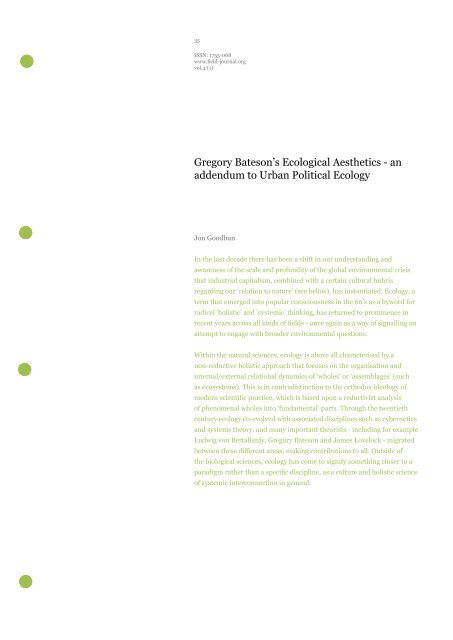
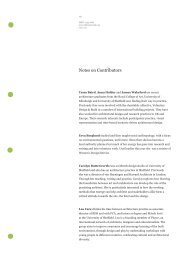
![ATLAS of Interdependence[889k] - field journal](https://img.yumpu.com/20827625/1/184x260/atlas-of-interdependence889k-field-journal.jpg?quality=85)
